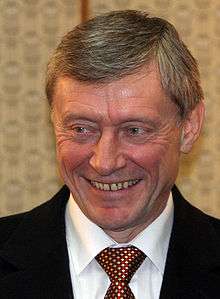Nikolay Bordyuzha
Nikolay Nikolayevich Bordyuzha (Russian: Никола́й Никола́евич Бордю́жа, born 1949 in Oryol) is a Russian general and politician.
Nikolay Bordyuzha | |
|---|---|
 | |
| Secretary-General of the Collective Security Treaty Organization | |
| In office 28 April 2003 – 2 May 2017 | |
| Preceded by | Valeriy Nikolayenko |
| Succeeded by | Yuri Khatchaturov |
| Personal details | |
| Born | Nikolay Nikolayevich Bordyuzha 1949 Oryol, RSFSR, Soviet Union |
| Military service | |
| Allegiance | |
| Branch/service | |
| Years of service | 1968–present |
| Rank | Colonel-General |
Biography
In 1972, he graduated from Perm Military School of the High Command of the Russian Strategic Rocket Forces and later attended KGB intelligence courses in Novosibirsk.
From 1989 to 1991, he was Head of KGB human resources, and from 1992 to 1998 served as First Deputy Chief and later Chief of Russia's Federal Borderguard Service.
On 7 December 1998, he was appointed Secretary of the Security Council of the Russian Federation, and also Chief of the Russian presidential administration.[1] He served in this position until 18 March 1999. During this period he was viewed by some analysts as a possible successor to President Boris Yeltsin.
From 1999 to 2003, Bordyuzha served as the Russian ambassador to Denmark.
On 28 April 2003, he was appointed Secretary General of the Collective Security Treaty Organization, a military pact of the Commonwealth of Independent States.
He holds the rank of Colonel General.
Honours and awards
Russian Federation
- Order For Merit to the Fatherland, 4th class
- Order of Courage
- Order of Friendship
- Medal For Distinction in Protection of the State Borders
- Medal "In Commemoration of the 850th Anniversary of Moscow"
Soviet Union
Foreign
- Order of Friendship (Kazakhstan)
- Order of Friendship of Peoples (Belarus)
External links
- Bordyuzha's biography (in Russian)
| Preceded by Andrey Kokoshin |
Secretary of the Security Council of the Russian Federation 1998 - 1999 |
Succeeded by Vladimir Putin |
| Preceded by Valentin Yumashev |
Chief of the Russian presidential administration 7 December 1998, – March 1999 |
Succeeded by Alexander Voloshin |